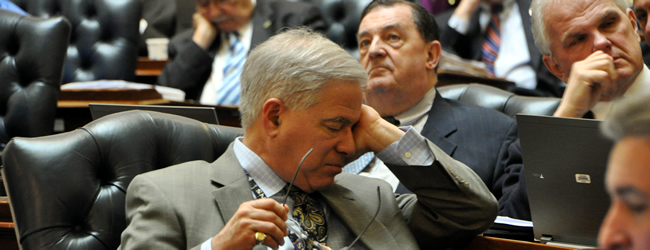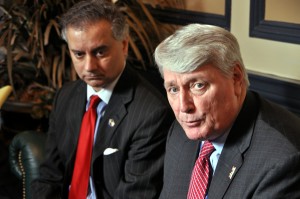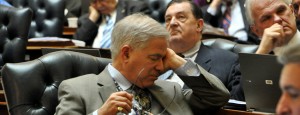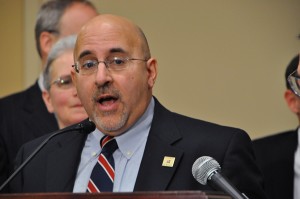Local
‘Strategic blunder of monstrous proportions’
Insiders rip HRC, Gill decision to cancel Maryland vote on marriage

The decision to cancel a March 11 vote on a same-sex marriage bill in the Maryland House of Delegates was a mistake that could hurt rather than help the chances for passing the bill within the next several years, according to Maryland-based advocates who lobbied for the bill.
The advocates who expressed this view, some of whom spoke on condition that they not be identified, said at least four national LGBT groups put pressure on lawmakers through Equality Maryland, the statewide LGBT group, to withdraw the bill rather than risk a losing vote.
One of the advocates called the national groups and their political operatives who came to Maryland to lobby for the bill well intentioned but unfamiliar with the nuances and “rhythms” of the Maryland Legislature.
“I think this was a strategic blunder of monstrous proportions,” said Mark McLaurin, political director of Maryland’s Local 500 of the Service Employees International Union (SEIU), which lobbied for the bill.
McLaurin, a gay man who has lobbied the Maryland Legislature for progressive causes for more than 15 years, said many insiders familiar with the legislature don’t think a losing vote by a close margin would hurt the bill’s chances in the future.
On the other hand, McLaurin and others who favored taking a vote on the marriage bill said the legislature has a history of not taking up highly controversial bills two years in a row. McLaurin said he fears that the bill won’t come back for a vote until 2015, even though Speaker of the House Michael Busch (D-Anne Arundel County) said he would try to bring the measure back in 2012.
Busch said supporters appeared to fall just a few votes shy of the 71 votes needed to pass the bill in the 141-member House. However, he said wavering delegates might have chosen to vote “yes,” raising the possibility that the bill could have passed.
Several knowledgeable sources, who spoke on condition of anonymity, agreed with McLaurin’s assessment.
“Gill and HRC decided it was detrimental to the larger movement to have the vote go down,” one source said. “Gays and lesbians in Maryland deserved a debate and a vote on legislation that we waited years for.”
Another source criticized Busch’s handling of the bill.

Maryland House of Delegates Majority Leader Kumar Barve and Maryland House Speaker Michael Busch (Washington Blade photo by Michael Key)
“[Speaker Michael] Busch could have squeezed harder but didn’t. This is a new House of Delegates and this man didn’t bother to take the temperature of the new House of Delegates. I was shocked. I thought House leadership was more strategic, intelligent and powerful than this and it all evaporated.
“God forbid we put our swing vote Democrats on the line to take a vote for our families. Or maybe the Speaker has lost control of his chamber.”
There was also criticism of Gov. Martin O’Malley, who the sources faulted for not taking a more public stand in support of the bill.
“O’Malley stopped by Friday for a photo op with marriage supporters,” one source said. “What a vacant gesture at the 11th hour. You couldn’t write an op-ed the week before?”
The Civil Marriage Protection Act won approval in the Maryland Senate earlier this month. It died last Friday for at least this year when the House of Delegates approved by voice vote a motion to send it back to committee.
All of the bill’s sponsors, including seven openly gay members of the House of Delegates, appeared to support the motion, a development that stunned LGBT activists watching the proceedings from the visitors’ gallery.
The motion to recommit the bill to committee came after supporters and opponents engaged in an emotional, two-and-a-half hour debate over the bill. Most of the activists for and against the bill watching from the galleries didn’t know that the bill’s sponsors had decided beforehand to cancel the vote.
McLaurin said he learned from those attending strategy meetings that the eight-member LGBT Caucus of the legislature was divided over whether to postpone the House vote.
The caucus includes Sen. Richard Madaleno (D-Montgomery County), and House of Delegates members Maggie McIntosh, Mary Washington, and Luke Clippinger, each Democrats from Baltimore; Heather Mizeur, Bonnie Cullison, and Anne Kaiser, each Democrats from Montgomery County; and Peter Murphy, a Democrat from Charles County.
Spokespersons for Equality Maryland, the statewide LGBT group that led the lobbying effort for the bill, and officials with the national groups Freedom to Marry and Human Rights Campaign defended the decision to withdraw the bill.
They said the decision was made jointly by the bill’s lead sponsors, including the one gay male and six lesbian delegates, who determined it was better to postpone the vote than to risk a losing vote, which they said would be perceived as a defeat.
“This is a strategic effort to give ourselves more time to make the case and win,” said Evan Wolfson, executive director of Freedom to Marry. “And all of us believe we can win. It’s just a matter of nailing down the votes and getting there.”
HRC spokesperson Fred Sainz said the decision to cancel the vote came after it became clear that supporters didn’t have the votes to pass it.
“This was a shared decision by all the stakeholders – Equality Maryland, the state’s LGBT Caucus, Gill Action, Freedom to Marry, and HRC,” he said. “It was the consensus belief that the best way to win marriage in Maryland was by a delay and not by losing a vote.”
Officials with Gill Action, a philanthropic group founded by gay businessman Tim Gill in Colorado that funds LGBT rights causes, did not return a call seeking comment.
An official with the Gay & Lesbian Victory Fund, Robin Brand, also pushed for postponing the vote, activists familiar with the legislature said. Brand told the Blade she discussed the issue with the gay delegates in the Victory Fund’s role of working with openly gay elected officials. She said she left it up to them to decide on whether or not a vote should be taken.
McLaurin, a former member of the Equality Maryland board, said the advocates who wanted the vote to go forward believe it would have been worth “a roll of the dice” to determine if supporters had the 71 votes needed to pass the bill.
“In the worst case scenario we would have come up two or three votes short,” he said. “And I think that a loss by two or three votes would be much more galvanizing to the community of supporters that we’re going to need to rally and accomplish this goal.”
McLaurin added, “Either way it was going to get billed as a failure. I’d rather have on record who’s with us and who’s against us.”
Another former Equality Maryland board member, David Toth, wrote in a Facebook posting that the group was deleting messages left on its own Facebook page that were posted by a large number of supporters who expressed outrage over the decision not to have a vote on the bill.
“Anyone who is asking questions of EqMD or its staff is having their posts deleted like crazy,” he wrote. “After donating thousands of dollars and working on the board for over six years I simply find this appalling.”
Wolfson of Freedom to Marry cautioned that a public fight over the decision not to have a vote could hurt efforts to bring the bill back next year.
“This is a temporary pause in the voting and it’s not a pause in the work,” he said. “So we don’t need finger pointing and recriminations, we need redoubling the effort to win.”
Although Equality Maryland, led by executive director, Morgan Meneses-Sheets, was billed as the lead organization calling the shots, insiders say field workers from the national groups like Freedom to Marry, HRC and Gill Action Fund far outnumbered Equality Maryland’s staffers working the halls of the legislature in Annapolis.
It was the national groups, rather than Equality Maryland, that had the ear of supportive lawmakers, including the LGBT Caucus members, during the days leading up to the scheduled vote on the bill in the House, McLaurin and other insiders said.
In a March 10 e-mail sent to LGBT Caucus members and other lawmakers supporting the bill, representatives of Freedom to Marry, Gill Action and HRC urged the lawmakers to postpone the vote.
“With the rights of so many Marylanders on the line, we wanted to flag our serious concern about going to a floor vote tomorrow when it’s not been confirmed we have 71 votes,” the e-mail says. “Various counts have us at 69 or 70 but not 71 or beyond.”
The e-mail adds, “The decision on whether to ask the leadership to move forward or postpone the vote rests with our openly LGBT legislators and other sponsors (in consultation with EQMD) who know their colleagues far better than we do, and who have so courageously led the way.”
The e-mail was signed by Bill Smith and Sarah Vaughn, national political director and deputy political director of Gill Action; Marty Rouse and Sultan Shakir, the lead officials at HRC’s field office; and Marc Solomon, national campaign director for Freedom to Marry.
In a separate e-mail sent the next day to most of the same people, HRC’s Rouse warned of serious political consequences if a vote on the marriage bill were to be taken.
“I plead with you to please delay this vote,” he said. “It would be devastating to suffer a huge loss. There will be vitriol and pain that may take years to soothe.”
Rouse said he also feared that a losing vote would damage relationships between the LGBT community and lawmakers who voted against the bill.
“I am sure that relationships are already frayed, but, if there are impassioned speeches on the floor, and tears shed, and we still lose, those relationships will be damaged even more. The air in the chamber will be toxic for months if not years,” he said.
McLaurin said at least some of the strained relations that Rouse mentioned have already come about, in part, because of the impassioned debate on the House floor that took place on March 11. He said he was puzzled over why those making the decision chose to have the debate and not go one step further to allow a vote to take place.
According to McLaurin, Speaker Busch left it up to the bill’s supporters and Equality Maryland to make the final call on whether to have a vote.
“From what I’ve been told by people in the know, he said, ‘What’s your pleasure? I’ll defer to you.’”
“And so from my understanding, there was a lot of pressure from the national organizations not to pull the trigger on a vote unless you are certain you had 71 votes because apparently it would demoralize our [same-sex marriage] efforts in Rhode Island and New York,” said McLaurin.
“I say poppycock. Pulling the bill from the floor is a defeat every bit as much as a losing vote is,” he said.
McLaurin said he thinks some of the national LGBT officials pushing for a delay in the Maryland vote had a fundamental misunderstanding that the Maryland House of Delegates would act like the New York State Senate acted in 2008, when it defeated a same-same marriage bill by a 38-24 vote.
Most supporters of the New York bill thought the vote would be much closer. Gay State Sen. Tom Duane (D-Manhattan) said he believed he had lined up enough votes to pass the measure. But when a roll-call vote started, a few wavering senators voted no, causing what observers called a cascading or “avalanche” effect, prompting others whose support was shaky to vote no.
McLaurin said such a development could not happen in the Maryland House of Delegates because all votes are cast electronically at the same time. No one knows who votes which way until the final tally is released seconds after the votes are cast. Pages on the floor then distribute a printout showing how the delegates voted.
“That’s why one of my underlying themes is you’ve got to know the Maryland Legislature,” he said. “We can’t have national groups fly in from L.A. and New York and train in from D.C. and conduct this campaign because we’re fundamentally different. We’re a different body.”
If some of the national group representatives had been in Annapolis at the time the legislature debated a highly contentious bill to repeal the state’s death penalty in 2007 or during several abortion related debates in the 1990s they would have seen a great reluctance to revisit these issues a second time, McLaurin said.
“What I fear is next year there’s just not going to be the stomach to do this again,” he said in discussing the marriage bill. “If you listened to the debate on the floor, everyone spoke of how deeply divided the House was, how deeply emotional this was, how it frayed relationships, how people weren’t speaking to each other.
“Do you think they will have the stomach to do that again next year without any reasonable expectation of a different outcome because they’re still pitching the same ideas to the same audience?”
“No one would be happier to be wrong about this than me,” he said. “But I just don’t think that I am. And I know I’m not alone. Some of the chief strategists behind this bill feel the same way I do.”
Wolfson of Freedom to Marry disputes that assessment.
“Anyone who is making comments to you or to anyone else suggesting that somehow this is over and it’s now a cause for finger pointing has failed to understand that it’s not over,” he said. “We’re in the midst of the work and we all should keep our eye on the prize of doing what we can to round up the last few votes and win.”
Maryland
Md. Commission on LGBTQIA+ Affairs released updated student recommendations
LGBTQ students report higher rates of bullying, suicide

The Maryland Commission on LGBTQIA+ Affairs has released updated recommendations on how the state’s schools can support LGBTQ students.
The updated 16-page document outlines eight “actionable recommendations” for Maryland schools, supplemented with data and links to additional resources. The recommendations are:
- Developing and passing a uniform statewide and comprehensive policy aimed at protecting “transgender, nonbinary, and gender expansive students” against discrimination. The recommendation lists minimum requirements for the policy to address: name, pronoun usage, and restroom access.
- Requiring all educators to receive training about the specific needs of LGBTQ students, by trained facilitators. The training’s “core competencies” include instruction on terminology, data, and support for students.
- Implementing LGBTQ-inclusive curricula and preventing book bans. The report highlights a “comprehensive sexual education curriculum” as specifically important in the overall education curriculum. It also states the curriculum will “provide all students with life-saving information about how to protect themselves and others in sexual and romantic situations.”
- Establishing Gender Sexuality Alliances “at all schools and in all grade levels.” This recommendation includes measures on how to adequately establish effective GSAs, such as campaign advertising, and official state resources that outline how to establish and maintain a GSA.
- Providing resources to students’ family members and supporters. This recommendation proposes partnering with local education agencies to provide “culturally responsive, LGBTQIA+ affirming family engagement initiatives.”
- Collecting statewide data on LGBTQ youth. The data on Maryland’s LGBTQ youth population is sparse and non-exhaustive, and this recommendation seeks to collect information to inform policy and programming across the state for LGBTQ youth.
- Hiring a full-time team at the Maryland Department of Education that focuses on LGBTQ student achievement. These employees would have specific duties that include “advising on local and state, and federal policy” as well as developing the LGBTQ curriculum, and organizing the data and family resources.
- Promoting and ensuring awareness of the 2024 guidelines to support LGBTQ students.
The commission has 21 members, with elections every year, and open volunteer positions. It was created in 2021 and amended in 2023 to add more members.
The Governor’s Office of Communication says the commission’s goal is “to serve LGBTQIA+ Marylanders by galvanizing community voices, researching and addressing challenges, and advocating for policies to advance equity and inclusion.”
The commission is tasked with coming up with yearly recommendations. This year’s aim “to ensure that every child can learn in a safe, inclusive, and supportive environment.”
The Human Rights Campaign’s most recent report on LGBTQ youth revealed that 46.1 percent of LGBTQ youth felt unsafe in some school settings. Those numbers are higher for transgender students, with 54.9 percent of them saying they feel unsafe in school.
Maryland’s High School Youth Risk Behavior Survey reveals a disparity in mental health issues and concerns among students who identify as LGBTQ, compared to those who are heterosexual. LGBTQ students report higher rates of bullying, feelings of hopelessness, and suicidal thoughts. Nearly 36 percent of LGBTQ students report they have a suicide plan, and 26.7 percent of respondents say they have attempted to die by suicide.
The commission’s recommendations seek to combat the mental health crisis among the state’s LGBTQ students. They are also a call for local and state governments to work towards implementing them.
Virginia
Va. lawmakers consider partial restoration of Ryan White funds
State Department of Health in 2025 cut $20 million from Part B program

The Virginia General Assembly is considering the partial restoration of HIV funding that the state’s Department of Health cut last year.
The Department of Health in 2025 cut $20 million — or 67 percent of total funding — from the Ryan White Part B program.
The funding cuts started with the Trump-Vance administration passing budget cuts to federal HIV screening and protection programs. Rebate issues between the Virginia Department of Health and the company that provides HIV medications began.
Advocates say the funding cuts have disproportionately impacted lower-income people.
The Ryan White HIV/AIDS Program, a federal program started in 1990, provides medical services, public education, and essential services. Part B offers 21 services, seven of which remained funded after the budget cuts.
Equality Virginia notes “in 2025, a 67 percent reduction severely destabilized HIV services across the commonwealth.”
Virginia lawmakers have approved two bills — House Bill 30 and Senate Bill 30 — that would partially restore the funding. The Ryan White cuts remain a concern among community members.
Both chambers of the General Assembly must review their proposed changes before lawmakers can adopt the bills.
“While these amendments aren’t a full restoration of what community-based organizations lost, this marks a critical step toward stabilizing care for thousands of Virginians living with HIV,” said Equality Virginia Executive Director Narissa Rahaman. “Equality Virginia plans to continue their contact with lawmakers and delegates through the conference and up until the passing of the budget.”
“We appreciate lawmakers from both sides of the aisle who recognized the urgency of this moment and will work to ensure funding remains in the final version signed by the governor,” added Rahaman.
District of Columbia
D.C. Black Pride theme, performers announced at ‘Speakeasy’
Durand Bernarr to headline 2026 programming

The Center for Black Equity held its 2026 DC Black Pride Theme Reveal event at Union Stage on Monday. The evening, a “Speakeasy Happy Hour,” was hosted by Anthony Oakes and featured performances by Lolita Leopard and Keith Angelo. The Center for Black Equity organizes DC Black Pride.
Kenya Hutton, Center for Black Equity president and CEO, spoke following the performances by Leopard and Angelo. Hutton announced this year’s theme for DC Black Pride: “New Black Renaissance.”
Performers for 2026 DC Black Pride were announced to be Bang Garcon, Be Steadwell, Jay Columbus, Bennu Byrd, Rue Pratt and Akeem Woods.
Singer-songwriter Durand Bernarr was announced as the headliner for the 2026 festivities. Bernerr gave brief remarks through a video played on the screen at the stage.
DC Black Pride is scheduled for May 22-25. For more information on DC Black Pride, visit dcblackpride.org.





















